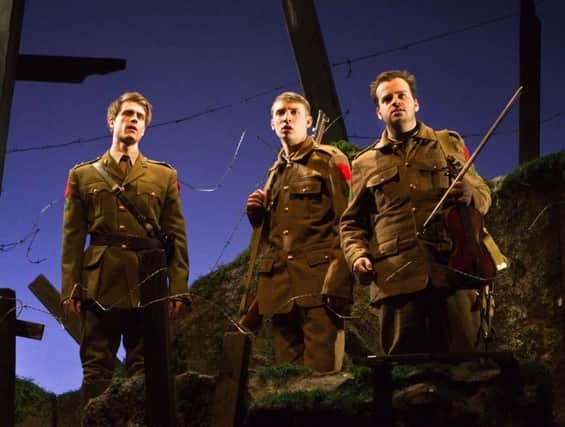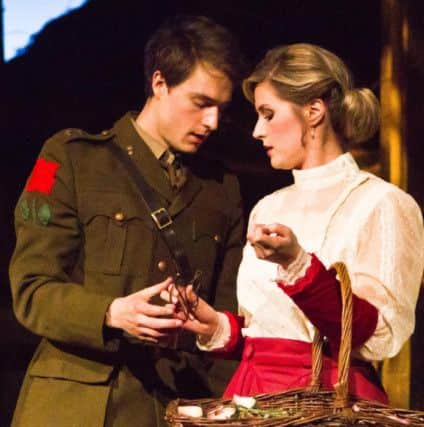Birdsong (review)
This article contains affiliate links. We may earn a small commission on items purchased through this article, but that does not affect our editorial judgement.


Rachel Wagstaff’s stage version is a triumph. The original book is an engrossing but unwieldy doorstop yet she’s managed to get to the heart of the story and still bring in a powerful and compelling drama that comes in at two-and-a-half hours.
The multi-layered story follows the journey of Stephen Wraysford from burgeoning industrialist in pre-war France to shell-shocked survivor of one of the most brutal and bloodiest of wars.
Advertisement
Hide AdAdvertisement
Hide AdAmid the carnage that was Ypres, Paschendale and The Somme is the illicit love story between Wraysford and Isabelle Azaire, the wife of a sadistic French factory-owner who initially welcomes the Englishman as a guest into his home.


Birdsong is a complicated story that was never envisaged as a stage play - and it shows. There are constant flashbacks and quick-change scenes that take you from claustrophobic tunnels underneath the Western Front to Isabelle’s chateau, the French countryside, a whorehouse, inn, hospital and the trenches themselves - and all on the Royal’s snug stage.
But director Alastair Whatley has come up with a remarkable production, completely different from the West End version I saw a few years ago, that boldly drives through the story with a cast who changes time and location with a twist of the shoulder or a quick change of costume.
Wraysford is played by relative new boy Jonathan Smith and he follows Ben Barnes and Eddie Redmayne in a part that is both complex and challenging.
Advertisement
Hide AdAdvertisement
Hide AdIt’s difficult to like Wraysford, even when he’s facing death. The man finds it impossible to engage with his men. When he’s chastised by his commanding officer for his detachment he retorts: “What’s the point? They are all going to die.” He has a point.
Is it British reserve? A result of his loveless upbringing? Or is he simply symbolic of the officer class so brilliantly satirised in Oh What A Lovely War?
But at least you can understand the articulate and rather handsome Mr Smith after Redmayne’s lockjawed mumblings in the TV version of the story. He does a great job of switching from drunk to lover to traumatised leader of men.
The character that you are most drawn to is tunneller Jack Firebrace who represents the common man thrown into an unimaginable hell.
Advertisement
Hide AdAdvertisement
Hide AdWe first meet Tim Treloar’s grimy-faced Jack regaling the lads with a bar-room ballad before heading back into the mud and darkness to continue digging tunnels towards the Hun in a game that sees the Germans digging parallel tunnels towards the Tommies.
His lad is back home in Blighty fighting diptheria, not that Wraysford cares, and his mates live one shovel of soil at a time. Jack’s the real hero of the piece and he breaks your heart. Treloar does him proud.
While it is impossible to empathise with Wraysford it is easy to warm to the other sappers -Evans (Tim Van Eyken) who spends most of his time on the toilet and, particularly, Jack’s best mate Shaw (Liam McCormick). The dialogue they share together is moving and emotional, epitomising an enduring friendship formed in the trenches.
Then there’s young soldier Tipper, just 15, who lied about his age to enlist.
Advertisement
Hide AdAdvertisement
Hide AdArthur Bostrom delivers a bit of an ‘Allo ‘Allo accent as Isabelle’s neighbour Berard but redeems himself with two other roles back in the English ranks while Malcolm James, who was so memorable in Equus when it came to The Grove, Dunstable, gives two superb and contrasting turns as the brutal Rene Azaire and Wraysford’s compassionate superior, the Scot-born Captain Gray.
Sarah Jayne Dunn as Isabelle has little to do other than play the victim of war. Her one highly choreographed moment of passion, played out in Wraysford’s fevered mind, was a nice touch that ensured the stage play didn’t overstep the bounds of decency.
The audience is put through an emotional wringer. You will leave with a lump in your throat and a tear in your eye so take some tissues. Like Journey’s End it mines a dark and unforgettable moment in our past that, as the big speeches that close both stories stress, cannot be allowed to happen again.
Running at Royal & Derngate, Northampton until Saturday. For tickets call the box office 01604 624811 or go online www.royalandderngate.co.uk It comes to Milton Keynes Theatre on July 22 for a week. For tickets call 0844 871 7652 or www.atgtickets.com/miltonkeynes@LBOanne